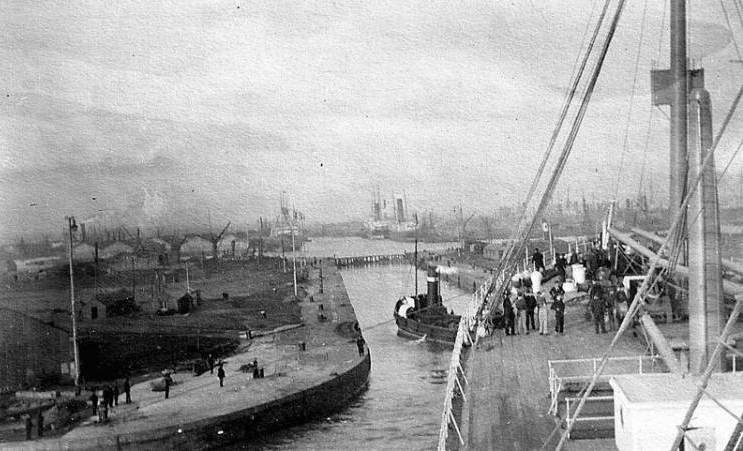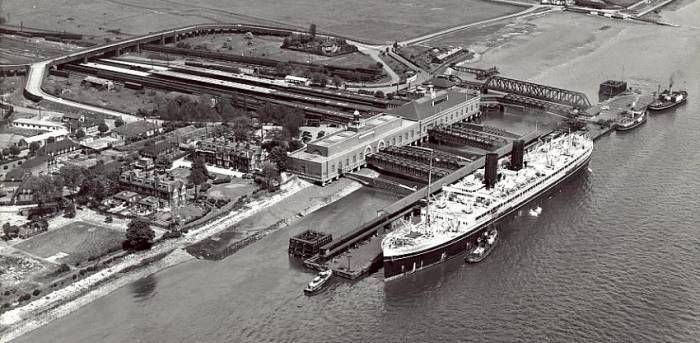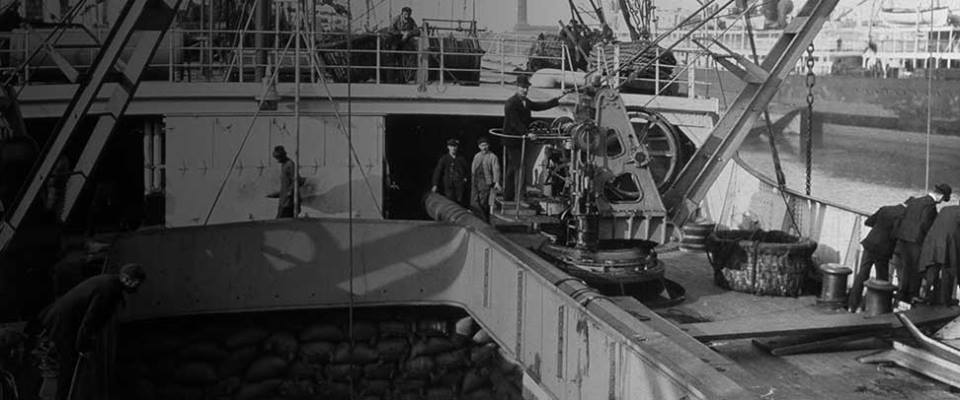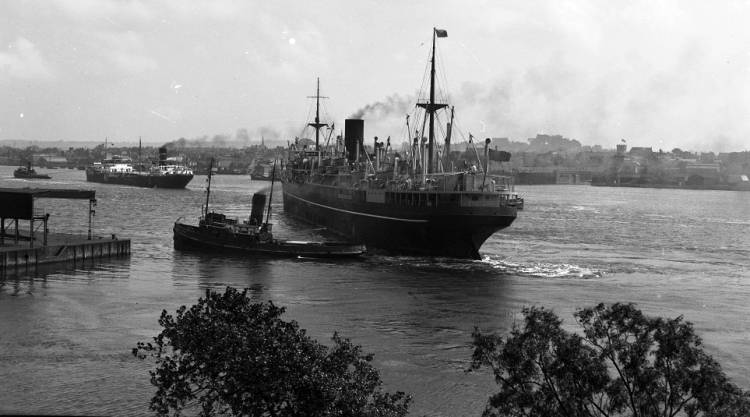The P.& 0. In London ~ Turning Round a Big Ship
Extracts from The Times, Tuesday 7th September 1937.

In its earliest days most of the voyages of the P.& 0. Company's ships began in the Thames, although there was generally a Channel call for passengers and mails. Then for some years the company favoured Southampton, returning to London permanently in 1881. Yet very few people outside the shipping world know what the Line means to employment on the river and what occurs there, for, naturally, the passenger sees very little of the ship in port. The company maintains a big shore staff, not only in Leadenhall Street and in Cockspur Street but also alongside all its regular berths in the docks. This staff is drawn from all departments and is of all grades under the various superintendents, including a number of seamen and stewards. The company's staff is, however, only a small proportion of those who find work connected with the services. There are dock labourers, tally clerks, stevedores, winchmen, and many others on cargo work. With the ships running to strict schedule any delay in port has to be avoided at all cost and the shore staff has to organize everything and arrange for the necessary labour well in advance. Indents are sent overland from Marseilles, or by air when necessary, and plans are made long before the ship arrives. The P. &.0. uses Tilbury Docks for the regular Bombay and Australian ships and most of the special Bombay voyages, King George V Dock at North Woolwich for its Eastern ships, and occasionally the Royal Albert Dock for the 'smaller cargo vessels. Each group of berths has its own organization. Generally the ships keep railway time and reckoning can be made from their leaving Marseilles; but it is impossible to be certain of anything at sea and from the time they enter the Channel the London staff has to be on the 'alert.'

The Plymouth call enables the mails, all gold, and a proportion of the passengers to be landed, and the company's "choice pilot” embarks, although he does not take charge of the ship until she is abreast of the Isle of Wight. If the Plymouth call is omitted she takes the pilot next on turn in the cutter cruising off Dungeness. The shore staff receive wireless-warning if there is likely to be any change in the time of arrival, and orders may have to be given to delay for a time. Tugs and barges have to be engaged at a set time and arrangements made with the Port of London Authority for landing stage and dock accommodation, and for the Customs, immigration and health officials. The railway must have a precise time for its special trains; friends of passengers need to be kept informed. Most important of all is dock labour to handle the cargo the moment the hatches are off, and the cost of a patch of fog in the Lower River, delaying the ship a few hours, may be judged by the fact that probably at least 300 men-will be waiting with a minimum of half a day's pay whether they are working or not. As the ship steams up Gravesend Reach there are various officials demanding attention. The visit of the Customs launch is formal, for most of the work is done at the landing stage or in the dock. The health authorities visit every ship coming from ports where plague of any sort may be suspected- practically anywhere east of. Suez - but the cooperation of the ship's doctor, who is a specialist in such things, reduces the delay to a minimum. The immigration authorities usually wait until the ship is alongside to board her for the examination of passports. The tugs which are to attend the ship go well down the Reach to meet her, one of them carrying the river pilot, who relieves the sea pilot as she passes Gravesend. Two or three tugs will be employed by each ship according to the circumstances and the weather. and Watkins's tugs have done the P.& 0. work since 1837.
The increase in the size of steamers which made it necessary for them to have the assistance of tugs occurred at a time when, the decline of the sailing ship was robbing the towing companies of a lot of the business on which they had formerly depended. The design of the tug was modified accordingly. She is now planned entirely for the work that she will be called upon to do, and not for any job that might turn up, as she was in the old days. That is why the London river tugs are neither so big nor so powerful as those found in some other centres; if they were, they would not be nearly so efficient at their daily work of helping liners. The masters of the tugs which regularly attend the P.& 0. ships know the company's choice river pilots and their ideas. To keep the scheduled times careful organization is required for the many tasks necessary during the period of a liner's turn round. Their own knowledge of the Thames, too, is remarkable. The result is that the orders of the pilot on the bridge, conveyed in code with a pea-whistle, are obeyed almost before they are issued and the. understanding between the tug skippers and their engineers permits such delicate handling - it may be that only a dozen turns of the screw are necessary - that it is very rare for the slightest damage to be done in putting a big ship into position. Bringing a big ship alongside the passenger stage at Tilbury, with a strong tide running, is a very delicate operation, but it is much more convenient than the old system of tenders in midstream, and the passengers can pass through the baggage hall, where the Customs examination takes place, to the trains for London.
When a ship is destined for the King George V 'Dock and the tide serves her well she may save time by going straight up to Woolwich, but most of them land their passengers at the Tilbury Stage.

All P.& 0. ships, like other long-distance liners, carry large quantities of cargo in addition to their passengers, and the discharge of this begins as soon as they get into their berth in the dock. It is done under the supervision of the Customs, for there are few commodities not subject to duty nowadays. Barges cluster alongside and take their quota to wharves up-stream or to ships which will carry it to other ports, but the greater part goes into long sheds which are built alongside every berth, where it is examined and released to the consignees or their agents, who take it away by road or rail.
Most ships completing their voyage in the Port of London have European crews, who are immediately paid off according to law, leaving the ship in charge of a few keepers and a quartermaster or two whose services the company is anxious to retain. The bulk of the P.& 0. crews are Lascars, and by law they are bound to be kept together until they are discharged as an entire crew in India. All the key ratings except the Serang are white, and except for spells of leave, most of these remain on board, keeping guard on the gangways and doing various jobs until the ship is ready to sail again. There are very few white ratings in the company who do not regard themselves as continuous service men, being re-engaged voyage after voyage. .
While the cargo is being handled there is an immense amount of work to be done in the ship herself. Surveys, by the Board of Trade for passenger vessels and by the classification society interested for every type of ship, are almost continuous while a liner is in port, for expensive delay is avoided by doing the work in sections. After the fabric of the ship come her contents. Every long-distance liner has a well- equipped laundry, but though it is sufficient for the requirements of the passengers and to keep the crew in smart white uniforms through the tropics, it is quite inadequate for the ship's needs and as soon as she berths, thousands of items of laundry are landed, to be exchanged for clean and to be put on board the next ship. Fuelling is another big item, and although quantities of fuel oil are taken at most ports on the company's services, the chief port of supply is Aden. Large quantities of fresh water are pumped on board in London, but the quantity consumed by the passengers is so great that the supply has to be " topped up" at nearly every intermediate port. Boatswain's and purser's stores - the latter "unconsumable" but very breakable- are also shipped according to the indents received beforehand, which have. been very carefully checked by the superintendents.
Victualling is a business which is carried on the whole time the ship is in port, the purser's department being hard at work continuously. First the "empties" have to be landed - tons of them - and the food spaces cleaned and repainted where necessary. Heavy stores that will keep are loaded at once; the more delicate foods are left until the last moment and the cold chambers closed as soon as they are on board. In addition to the food required by the ship-an enormous assortment to satisfy the demands of the modern passenger - some of the refrigerated chambers that. would normally be empty on the outward voyage are used for carrying English delicacies, particularly fish and game, to Englishmen in India and the East.
As soon as the inward cargo is out of the ship the outward begins to come in. It is very miscellaneous - everything from heavy machinery to wallpaper and every package of a different shape - and as it arrives in the docks it is carefully arranged in the sheds according to the port of call. Stowing it into the ship is highly skilled work; not only must she be made to carry as much as possible but there must be no chance of anything breaking adrift in a sea, contact between commodities which contaminate one another must be avoided, and the cargo must be so stowed that goods consigned to the first port of call can be got out without disturbing the rest. As the distribution of weight has a great influence on the comfort of the ship's motion for her passengers, this has to be considered all the time.
As already remarked, the Lascars and a number of white ratings remain by the ship all through her stay. These Europeans were "signed on" the day the ship arrived, as soon as they had "signed off " from the last voyage. The balance, including all the stewardesses, are signed on three days before sailing, and quite a big staff in London is kept busy dealing with the advance notes and family allotments of each ship's crew.
The day before sailing the whole crew is mustered and inspected by the superintendent. Fire and boat stations are exercised and some of the boats are lowered into the dock and made to row or sail round it. Officers of the Board of Trade are usually present. They take no part in the drill, but report on it to headquarters. Later, one of the managing directors of the company comes down and goes through every part of the ship with representatives of each department, making a very careful and critical inspection.

Cargo will generally be coming in until the very last moment on sailing day, when it is often more convenient to embark the passengers in the dock instead of at the stage. Many will be arriving in cars for hours before the advertised time, but most by the special trains. Stewards get the luggage on board, farewells are said, and the ship is locked out of the dock into the open river. She always goes out stern foremost and it is the task of the river pilot and the masters of the attendant tugs to present her hull to the current in such a way that it is swung in exactly the right position for her to get a safe start downstream. The tugs cast off, the big screws get a grip of -the water, and the ship has started on another voyage.
Commander Nicholas R Messinger, RD*, FNI, RNR
Master Mariner, Fellow of The Nautical Institute, Galbraith Wrightson Senior Research Fellow, University of Plymouth